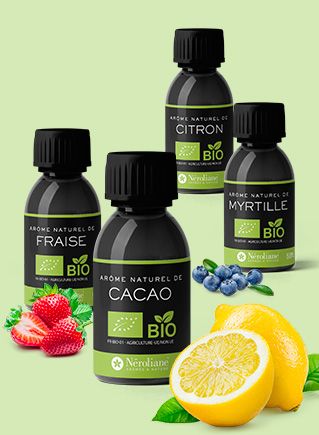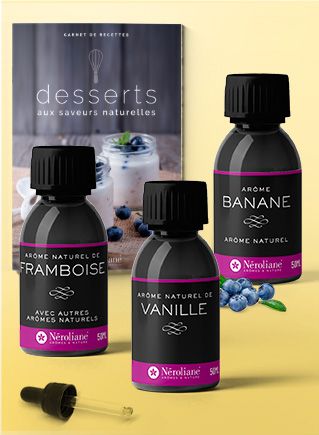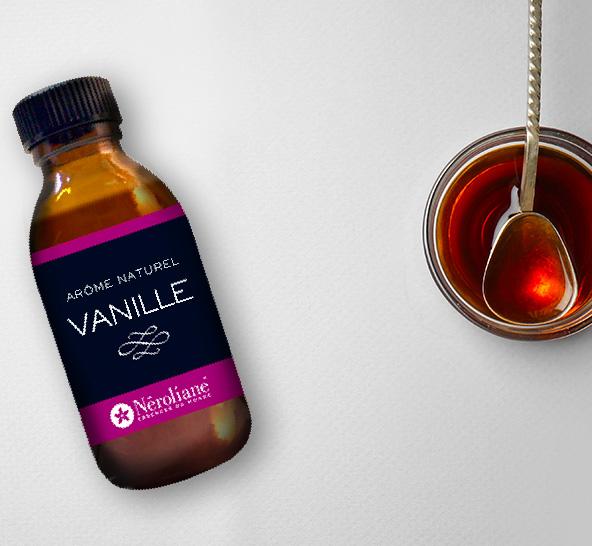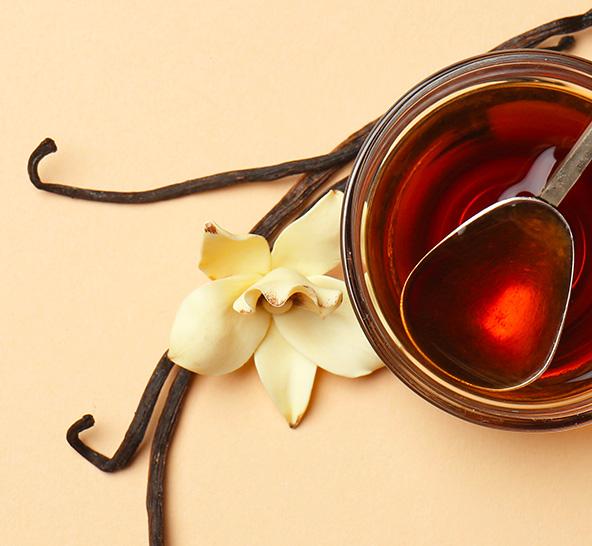Discover the latest natural organic flavours!
I discoverWhat are the differences between natural vanilla flavour and vanilla extract?

Are you a professional?
Access exclusive benefits by creating your pro account at Neroliane. Enjoy an immediate 15% discount on all your purchases!
Are you a professional?
Access exclusive benefits by creating your pro account at Neroliane. Enjoy an immediate 15% discount on all your purchases!
Difference between vanilla flavouring and vanilla essence
It can sometimes be difficult to navigate the baking aisle when choosing between the different forms of vanilla to incorporate this delicate spice into your recipes: flavouring, essence, extract... But how exactly can you tell the difference between vanilla flavouring or natural vanilla essence and vanilla essence?
Vanilla essence is a concentrate, generally more intense, which can be obtained naturally or synthetically. Natural vanilla essence or flavouring is made from the pods of the plant, offering a more authentic and deeper vanilla taste. However, many products called vanilla essence are artificial, obtained by synthesising the main molecule in vanilla, vanillin, which results in a cheaper product that is of lower quality and less complex in terms of flavour.
Vanilla flavouring is a broader term that refers to flavouring products and, like essence, can be natural or synthetic. Natural vanilla flavouring is obtained from natural raw materials, but it can be mixed with other substances to complement or modify its profile. It is therefore a more versatile option in cooking.
Essence and flavouring both offer different ways to incorporate vanilla flavour into recipes, but it is important to distinguish between their origin and quality before choosing the right product.
Difference between vanilla extract and natural vanilla flavouring
Vanilla extract and natural vanilla flavouring have in common the fact that they come directly from the fruit. However, these products are not presented to the public in their pure form, but mixed with another substance. According to European legislation, natural vanilla flavouring is produced exclusively, or at least 95%, from vanilla, with the remaining 5% coming from other natural molecules (which may impart other flavours to the flavouring). Vanilla extract, on the other hand, is obtained through a process called “extraction”: vanilla pods are immersed in an alcohol-based solvent (a hydroalcoholic solution) and then infused. The origin of the vanilla extract is essential in this process. To obtain an alcohol-free extract, this vanilla infusion is heated so that the alcohol evaporates and produces a paste.
The proportions are subject to strict standards: in the United States, for example, vanilla extract must contain at least 35% alcohol and 100 grams of vanilla pods per litre. Depending on the manufacturer and their recipe, the extract will have a more or less concentrated flavour. In any case, a very small amount is enough to give any recipe the best vanilla flavour.
Natural vanilla flavouring, obtained from vanilla extract
Vanilla extract concentrate is the basis of natural vanilla flavouring. The weakest part of the flavouring is there to give character, to give fresher, spicier, biscuity, buttery or milky notes to the original vanilla. The important thing is that the vanilla is recognisable first and foremost, but the flavour profile can be developed. The origin of the vanilla essence and the origin of the vanilla flavour are fundamental elements in selecting a good product, guaranteeing exceptional final quality.
What is the difference between natural vanilla flavouring and vanilla flavouring?
According to European legislation, an aroma can only be described as natural if its aromatic component consists exclusively of flavouring preparations and/or natural flavouring substances. While natural vanilla flavouring mainly contains vanilla extract, artificial vanilla flavouring is obtained from flavouring substances that are not of natural origin. The origin of vanilla flavouring is important in this case, as these flavourings are obtained from chemically synthesised molecules, in particular vanillin. Natural vanilla essence is obtained directly from the fruit, which gives it a superior quality.
How can you add vanilla flavouring to your recipes?
Have you bought vanilla flavouring to make delicious dishes, but don't know where the vanilla taste comes from or how to incorporate it into your desserts and other creams? Below, we explain how to add vanilla flavouring to your recipes.
Food flavourings are very easy to use and add a subtle vanilla flavour to food. Among the most popular food flavourings are coffee, lemon, strawberry, bitter almond, etc., and especially natural vanilla flavouring, which is much cheaper than real vanilla pods. However, one drop too many or too few can be enough to produce a disappointing result. Here are some tips for using the right amount of vanilla flavouring, whatever your recipe.
Specific dosage depending on the preparation
Vanilla flavouring is commonly used in sweet recipes: in ice cream, confectionery and dairy products, particularly yoghurts and yoghurt drinks. We will therefore focus on these three product categories first.
In general, vanilla flavouring is quite concentrated, so it should be used at a rate of 2 to 5% of the total preparation. Néroliane's experts recommend a specific dosage for each preparation: to make sweet and subtly flavoured ice creams, start with 3%. For 20 cl of ice cream, add one teaspoon of vanilla flavouring, or 6 ml. The same applies to dairy products.
The dosage is slightly higher for confectionery and pastries, with an optimal dose of 4%. For 200 grams of preparation, you can add one and a half teaspoons of vanilla flavouring, or about 8 ml.
Flavour combinations
You can also combine several flavours in the same recipe. Vanilla flavouring can be used in savoury recipes in combination with flavourings such as sweet almond, cardamom or hazelnut. In this case, it is important to reduce the amount of each flavouring, tasting the preparations as you go along.
You can add essential oils, such as pink peppercorn or black pepper, which are delicious when combined with vanilla. In your desserts, try combinations such as vanilla-cocoa flavouring, vanilla-elderflower flavouring, etc.
Choose natural vanilla flavourings
For best results, opt for natural vanilla flavourings whenever possible. You can find vanilla flavourings of all kinds and qualities online, in supermarkets and in some speciality shops. The quality of the vanilla essence is important, and choosing a natural vanilla flavouring guarantees that the flavouring is composed of at least 95% vanilla molecules.
If you are wondering how vanilla flavouring is made, it is important to know where the vanilla comes from and to choose high-quality ingredients. If you prefer a more artisanal touch, you can also learn how to make vanilla essence and add a personal touch to your creations.










